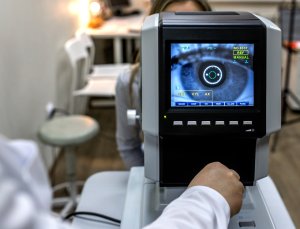“His expertise in his field is what saved my eyesight. I am so grateful...”
— Actual patient review posted on HealthGrades.com
Count on the diabetic eye care experts at Eye Consultants of Pennsylvania
The American Diabetes Association estimates that nearly 20 million Americans have been diagnosed with diabetes, and approximately 6 million more have the disease but don’t know it. If you have diabetes, a diabetic eye exam at least once a year can make a big difference.
What kind of diabetic eye problems can Diabetes cause? Diabetes can lead to oxidative stress, inflammation, and vascular damage causing microvascular complications that severely impair a patient’s quality of life. Diabetes can also lead to a number of serious diabetic eye problems, including diabetic retinopathy, diabetic macular edema, cataract and glaucoma. And all forms of diabetic eye disease have the potential to cause severe vision loss and even blindness.
- Diabetic retinopathy affects blood vessels in the light-sensitive tissue called the retina that lines the back of the eye. It is the most common cause of vision loss among people with diabetes and a leading cause of vision impairment and blindness among working-age adults.
- Diabetic macular edema (DME). A consequence of diabetic retinopathy, DME is swelling in an area of the retina called the macula.
Diabetic eye disease can also include cataract and glaucoma. Adults with diabetes are 2-5 times more likely than those without diabetes to develop a cataract. Cataracts also tends to develop at an earlier age in people with diabetes. With glaucoma, diabetes nearly doubles the risk of glaucoma in adults. That’s why early diagnosis and treatment are always the best options for diabetic patients. In fact, because diabetic eye disease often goes unnoticed until vision loss occurs, people with diabetes should get a diabetic eye exam at least once a year.
When it comes to diabetic eye care, insist on the experts
Each of our diabetic eye care specialists is Board-Certified and Fellowship-Trained. That’s quality and experience you can trust. They utilize the latest technology and enjoy an excellent reputation and high patient satisfaction. From the first moment a friendly staff member greets you, throughout your treatment, you’ll receive the compassionate care and personal attention that you deserve.
Diabetic Eye Care, Macular Degeneration, Retinal Eye Care
Board-Certified, Fellowship-Trained
Wyomissing, Pottsville, Lebanon
Diabetic Eye Care, Macular Degeneration, Retinal Eye Care
Board-Certified, Fellowship-Trained
Wyomissing, Pottstown, Pottsville
Diabetic Eye Care, Macular Degeneration, Retinal Eye Care
Board-Certified, Fellowship-Trained
Wyomissing, Pottstown, Pottsville
Why do patients lose vision from diabetic retinopathy?
In diabetic retinopathy, the blood vessels of the retina become damaged by high blood sugars. There are two major categories of diabetic retinopathy: nonproliferative (NPDR) and proliferative (PDR).
In nonproliferative diabetic retinopathy, damaged blood vessels leak fluid and blood which seep into the retina, especially the macula. When fluid accumulates in the macula and causes swelling, the central vision may become blurred. This condition is called macular edema and is often treated with laser. In some cases, the blood supply to the macula becomes affected, and ischemia develops.
Proliferative diabetic retinopathy is the advanced form of diabetic retinopathy which develops when new blood vessels grow in response to severe ischemia. The growth of new blood vessels is called neovascularization. These new blood vessels are abnormal and may cause severe bleeding, glaucoma, and retinal detachment. Neovascularization is often treated by applying a laser to the peripheral ischemic retina.
How can people with diabetes protect their vision?
Vision lost to diabetic retinopathy is sometimes irreversible. However, early detection and treatment can significantly reduce the risk of blindness. Because diabetic retinopathy often lacks early symptoms, people with diabetes should get a comprehensive dilated eye exam at least once a year. People with diabetic retinopathy may need eye exams more frequently. Women with diabetes who become pregnant should have a comprehensive dilated eye exam as soon as possible. Additional exams during pregnancy may be needed.
Studies such as the Diabetes Control and Complications Trial (DCCT) have shown that controlling diabetes slows the onset and worsening of diabetic retinopathy. DCCT study participants who kept their blood glucose level as close to normal as possible were significantly less likely than those without optimal glucose control to develop diabetic retinopathy, as well as kidney and nerve diseases. Other trials have shown that controlling elevated blood pressure and cholesterol can reduce the risk of vision loss among people with diabetes.
Bottom line: early detection and treatment is the best way to limit the negative effects of diabetic eye disease. If you have diabetes in any form, schedule a comprehensive eye exam with an experienced diabetic eye disease specialist at least once each year.
What are my treatment options?
Treatment options depend upon the nature of the diabetic eye disease but can include options from medications to laser surgery. Based on your vision diagnosis during examination, our diabetic eye care specialists will discuss with you the most appropriate treatment options.
Learn more about diabetic eye care diagnosis and treatment.
“My doctor’s expertise in his field is what saved my eyesight. I am so grateful for his outstanding knowledge and attention to detail. This is the physican you want.”
What do our patients say?
See what our patients say about the doctors at Eye Consultants of Pennsylvania.
Take the first step.
If you have diabetes (or you even suspect that you do), a careful, comprehensive eye examination by one of our diabetic eye specialists is the first step. Our doctors use very specialized technologies — and years of training and experience — to examine your eyes and check for the presence of disease. At your examination, your doctor will personally discuss with you the health of your eyes, how your condition is affecting your vision and what treatment options are available. The bottom line: trust the experts. Insist on Eye Consultants of Pennsylvania.
Does my insurance plan
cover my eye care?
Find out what insurance we accept and what is covered by insurance.
Learn more about
diabetic eye care
We’re committed to patient education. Get more information about diabetic eye care, including diagnoses and treatment options.
Schedule an Appointment
Schedule an appointment with one of our specialists.





